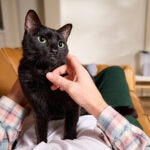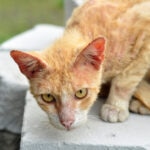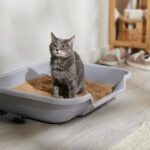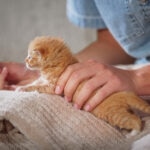Have a Cat Walking in Circles? Causes and Treatment
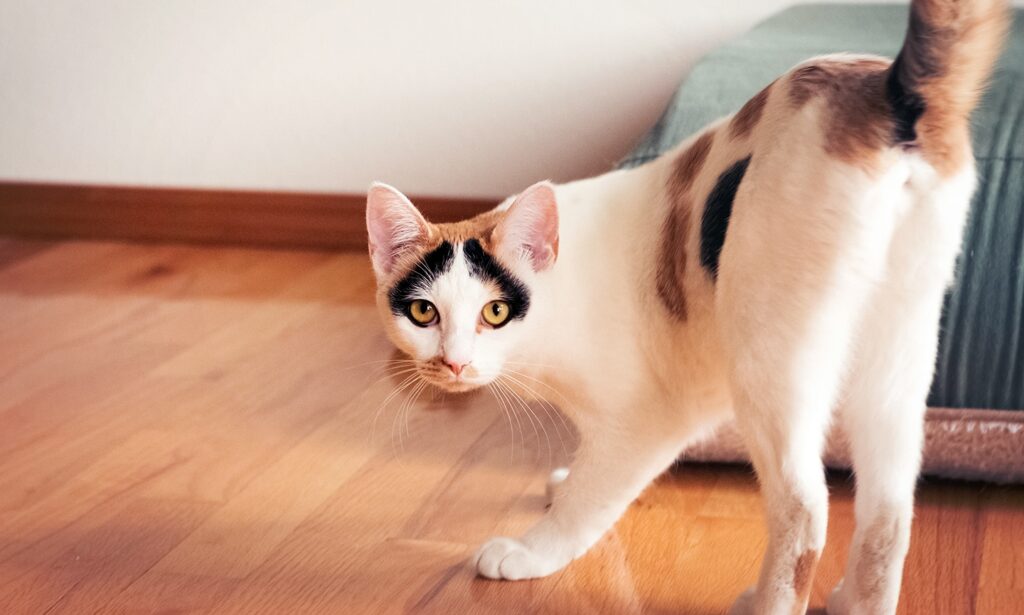
Photo by debibishop/iStock/Getty Images Plus via Getty Images
Cats are quirky little creatures, and while walking in circles can sometimes be a harmless or silly thing they do, it can also signal an underlying medical issue.
Walking in circles, especially when paired with falling over, drooling, or abnormal eye movements, can point to conditions ranging from stress to ear problems or head trauma.
Key Takeaways
- A cat walking in circles can be caused by ear issues, neurological conditions, stress, or normal feline behavior.
- One-sided circling or circling with balance issues is a medical red flag.
- Older cats are more likely to circle due to cognitive decline or serious medical conditions.
- Circling before lying down is normal and instinctual.
- Persistent or sudden circling should always be evaluated by a veterinarian.
Why Is My Cat Walking in Circles?
1. Ear Infections and Other Ear Issues
Outer or inner middle ear infections are one the most common causes of a cat walking in circles, according to veterinary behaviorist Dr. Leslie Sinn, DVM, ACVB, CPDT-KA, founder of Behavior Solutions in Ashburn, VA.
Ear infections can throw off a cat’s balance, which makes them walk in a circular motion. The discomfort can also trigger your cat to lean toward the affected ear and move around in circles.
Ear mites or the formation of polyps (little bumps) in the ear—something that cats are prone to, according to Dr. Sinn—may also be to blame.
2. Idiopathic Vestibular Disease
Your cat’s vestibular system, which is located in the inner ear and the brain, controls balance and coordination. Idiopathic vestibular disease is a vestibular problem that affects the inner ear and balance system for no known reason.
This can create vertigo-like symptoms. In addition to walking in circles, you might notice your cat tilting their head and leaning to one side. They may also fall over or seem really off balance. Nystagmus, a condition in which your cat’s eyes dart back and forth really quickly, is also a hallmark sign of some type of vestibular syndrome.
3. Brain Tumor
A brain tumor can trigger your cat to walk in circles as well, according to Dr. Sinn. Brain tumors can impact neural pathways anywhere from the outer ear to where the nerves plug into the brain, she says.
This affects balance and, as the brain tumor grows, it can cause behavioral and neurological changes, such as changes in movement, disorientation and/or excessive meowing. Often, walking in circles is directly connected to related vision problems that affect coordination.
4. Trauma or Head Injury
A traumatic brain injury can cause damage to the brain and trigger neurological symptoms, like walking in circles. In this case, you would typically see other signs of head trauma, like bleeding from the nose, ears or eyes; abnormal eye movement or appearance (pupils may be different sizes); vomiting and/or seizures.
These symptoms don’t always show up, though, so if you suspect a head injury, don’t rule it out on a lack of symptoms alone.
5. Untreated Hypertension
If left untreated, high blood pressure can lead to serious issues. Not only can it cause permanent damage to the eyes, nervous system, kidneys and heart, but in severe cases, it can lead to bleeding in the brain or a stroke, which, in turn, can make your cat walk in circles.
In this case, high blood pressure becomes a medical emergency and you should call your emergency vet ASAP.
6. Low Blood Sugar
Low blood sugar, medically referred to as hypoglycemia, can be another cause of a cat walking in circles. And it may be one of the first things that alerts you to potential diabetes in your cat.
Low blood sugar can also cause a loss of balance, lack of coordination, listlessness and coma (in severe cases). If you notice any of these clinical signs in addition to circling, make an appointment with your vet to check on your cat’s health.
7. Obsessive-Compulsive Behaviors
A physical health problem isn’t always to blame. According to Dr. Danny Cox, DVM, chief veterinary medical officer of Petzey in McKinney, TX, some cats have obsessive-compulsive behaviors that are often triggered by stress. This can prompt repetitive actions, like circling.
8. Other Health Conditions
As mentioned, some conditions like a bacterial infection or vestibular disease, can throw off your cat’s inner ear and physically cause walking in circles. Other conditions are more indirectly related to the behavior.
For example, Dr. Cox says your cat may have discomfort from arthritis, and circling may be their attempt to alleviate pressure or pain. Another example is ear mites. Like with an ear infection, your cat might lean toward the affected ear and start walking in circles. If ear mites are the cause, your cat will also likely scratch at their ears and shake their head a lot.
9. Boredom
This is more common in kittens, who are well known for being little balls of energy, says Joey Lusvardi, certified cat behavior consultant at Class Act Cats in Minneapolis, MN. If your kitten is walking in circles, and you don’t notice any other clinical signs, it can be a result of under-stimulation or boredom. It’s also possible they discovered their tail for the first time and haven’t quite figured out that it’s part of their own body.
But as with adult cats, kittens who display a sudden behavior change of any kind should be evaluated by a veterinarian, as there may be a medical problem that requires treatment.
10. Anxiety
Anxiety can also cause circling, but this looks very different from medically based reasons, according to Dr. Sinn. When anxiety, worry and/or anticipation are the main drivers, cats typically switch between circling to the left and the right; you’ll rarely ever see them circling in one direction only. They may also pace.
On the other hand, with a medical condition, circling is almost always on one side or the other only. This is the big red flag that something more serious may be going on, says Dr. Sinn.
Why Is My Older Cat Walking in Circles?
Senior cats are more likely to be dealing with a medical condition or experience some sort of cognitive decline, like feline cognitive dysfunction (the cat version of dementia), according to Lusvardi.
A big sign of cognitive decline in older cats is a switch in their day/night cycle, Dr. Sinn says. They may be more active at night (circling, pacing and vocalizing) and sleep more during the day. She says that older cats are also more likely to develop tumors and the older they get, the more likely cancer becomes.
If your old cat seems confused, is vocalizing more, has changes in litter box usage or generally seems off, Lusvardi says they should be evaluated by a veterinarian. Even if it’s not a cognitive issue, your vet will be able to rule out (or diagnose) a medical condition that may be causing changes in your cat’s behavior.
Why Do Cats Walk in Circles Before Lying Down?
Circling before lying down is a normal feline behavior and is not a cause for concern. Lusvardi says they do this for two main reasons:
First, they’re trying to make the spot more comfortable. This is an instinctive behavior that was necessary when your cat’s wild ancestors had to pat down grass and leaves to create a cozy sleeping area. While your domesticated (and likely spoiled!) cat doesn’t have to do this anymore, Dr. Cox says it’s an ingrained ritual. Cats are still picky creatures, and they want to make sure the spot is perfect before lying down.
Second, it helps them establish their territory. Circling before lying down is a way to ward off any potentially dangerous critters or unwanted guests that may be in their preferred resting spot.
When To Go to the Vet About a Cat Walking in Circles
Consult a veterinarian immediately if your cat’s circling is persistent, is accompanied by other unusual behaviors (like uncoordinated movement, head tilting or sudden lethargy), or appears to be a sign of distress or discomfort, Dr. Cox says.
One-sided circling is a big red flag, says Dr. Sinn. While circling isn’t always an emergency, it should be treated as a “pressing medical condition,” she says.
If your cat is having difficulty staying upright and the circling is impacting their ability to navigate the world, contact the emergency vet.
These can be signs of serious health issues, like neurological disorders, inner ear infections or exposure to toxins, which require prompt medical attention.
How Do Vets Diagnose the Cause?
Veterinarians diagnose circling in cats through a physical exam, neurological assessment, and diagnostic testing when needed.
If your vet suggests you bring your cat in for a check-up, they will typically conduct a comprehensive exam that includes a thorough medical history and physical assessment, according to Cox.
He says the physical portion of the exam will focus on the nervous system, vestibular system, balance and coordination. Depending on what they find, the next step may be additional diagnostic tests, like blood work, urinalysis and imaging (such as X-rays, CT scans or MRIs).
In some cases, your vet may want an analysis of cerebrospinal fluid to look for infections, tumors or systemic illnesses. This detailed approach helps isolate the cause and determine the most effective treatment plan, Dr. Cox says.
Treatment for a Cat Walking in Circles
Treatment for a cat walking in circles depends entirely on the underlying cause. For example, antibiotics or antiparasitics may be used for infections, surgery might be necessary for tumors, and anti-inflammatory medications could alleviate arthritis discomfort, according to Dr. Cox.
If your older cat is dealing with cognitive dysfunction, they may need a more multifaceted approach that involves environmental modifications, therapeutic diets and medications to help manage symptoms.
If a central problem in the brain is uncovered, Dr. Sinn says the pet parent will have to determine how they want to proceed. The next diagnostic step is typically an MRI, but some pet parents opt to treat symptomatically (for example, antibiotics for a suspected bacterial infection and/or anti-inflammatories). She cautions that going this route is more of a “best-guess” scenario and doesn’t help with tumors.
At the end of the day, it’s essential to have a precise diagnosis from a veterinarian so you can move forward with the appropriate and effective treatment, says Dr. Cox.
Once the cause is uncovered and you and your vet are comfortable with the treatment plan, you can also help by creating a safe, stress-free environment at home. Cox recommends keeping a consistent routine and providing mentally stimulating activities—this can be especially beneficial for aging cats who are experiencing cognitive decline or senility.
Of course, you also want to make sure you’re sticking to any prescribed medication schedule and/or recommended dietary changes.
Felines exhibit a lot of weird behaviors, but a cat walking in circles often points to a medical problem. It can be a sign of issues ranging from obsessive-compulsive behavior to more serious neurological conditions. If you notice persistent circling, outside of making a comfy spot to lie down for a nap, experts recommend calling your veterinarian immediately to figure out what’s going on and develop a treatment plan.
FAQs About Cats Walking In Circles
Why is my cat suddenly walking in circles?
Sudden circling in cats can be caused by ear infections, vestibular disease, head trauma, high blood pressure, neurological conditions, stress, or anxiety and should be evaluated by a veterinarian.
Is it normal for cats to walk in circles?
Circling before lying down can be normal, but persistent or repeated circling—especially outside of resting behavior—is not normal and may indicate a medical issue.
Why does my cat walk in circles in only one direction?
One-sided circling is a major red flag and often points to a medical problem such as inner ear disease or a neurological condition that needs prompt veterinary attention.
Can stress or anxiety make a cat walk in circles?
Yes. Stress-related circling is usually linked to anxiety or obsessive-compulsive behaviors and typically involves switching directions rather than circling one way only.
Why is my older cat walking in circles?
Older cats are more likely to circle due to cognitive dysfunction, high blood pressure, tumors, or other neurological conditions and should be examined by a veterinarian.
When should I take my cat to the vet for walking in circles?
You should see a veterinarian if circling is sudden, persistent, one-sided, or accompanied by balance problems, head tilting, abnormal eye movements, or lethargy.
How do vets diagnose why a cat is walking in circles?
Vets diagnose circling through a physical and neurological exam, medical history review, and diagnostic tests such as blood work or imaging when needed.
How is walking in circles treated in cats?
Treatment depends on the cause and may include medications, surgery, or supportive care based on the underlying medical condition.
Expert input provided by Dr. Danny Cox, DVM, chief veterinary medical officer of Petzey in McKinney, TX; Dr. Leslie Sinn, DVM, ACVB, CPDT-KA, founder of Behavior Solutions in Ashburn, VA; and Joey Lusvardi, certified cat behavior consultant at Class Act Cats in Minneapolis, MN.
